
vidaRPM | Postpartum: Your Health After Birth
You’ve given birth, now what? New mothers often have many questions about their health, their bodies and their emotions. You’ve spent the last nine months experiencing pregnancy, you’ll now spend the next few months experiencing postpartum.
This is a time to honor your role of birth giver and to take care of your health. Think of it this way, Your health is your baby’s health!
While the postpartum journey can look different for each woman, because each woman is different and each birth is different, here’s what you can expect.
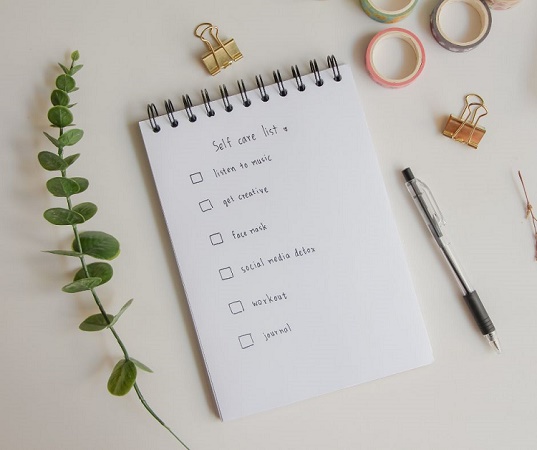
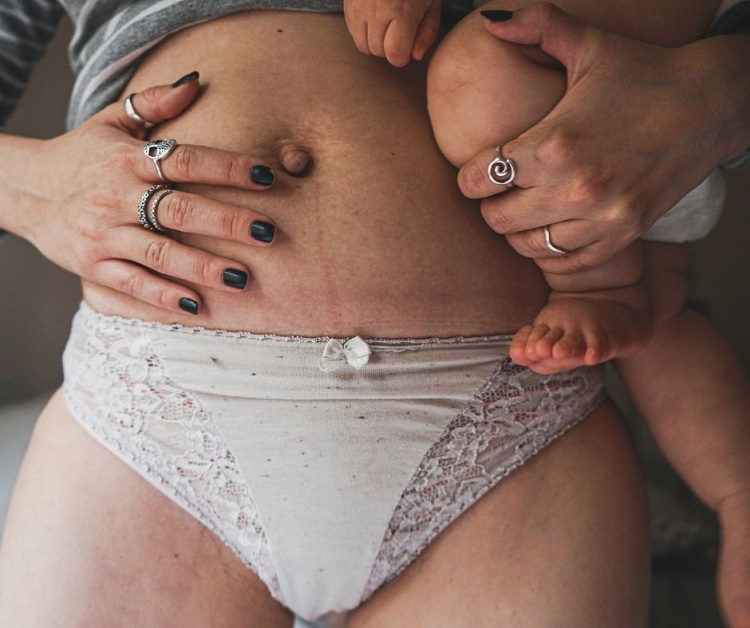

Postpartum, what is it?
Acute Phase
24 hours immediately following delivery
Sub-Acute Phase
can last 2-6 weeks following delivery
Late Phase
6 weeks - 6 months following delivery
Each phase consists of it’s own unique recovery and is often dependent on several contributing factors such as age, race/ethnicity, and health conditions. The postpartum period is often referred to as the fourth trimester and should be shown as much attention and respect as the first, second and third trimester. Here are some of the key things to expect immediately after giving birth and during the postpartum recovery process. For a more encompassing list, please seek advice from your medical team.
What's happening to your body?
During the first weeks after giving birth, your body begins to heal and adjust to not being pregnant. This recovery time and associated symptoms differ for each woman. Your medical care team can go into more details about any of the symptoms you experience or concerns you may have but knowing what might happen is helpful.
Some of the postpartum changes you may notice could be cramping, bleeding, soreness, vaginal discharge, engorged breast, feeling sad, hormonal shifts, mental changes, night sweats, tiredness, hemorrhoids, hair loss and swelling.
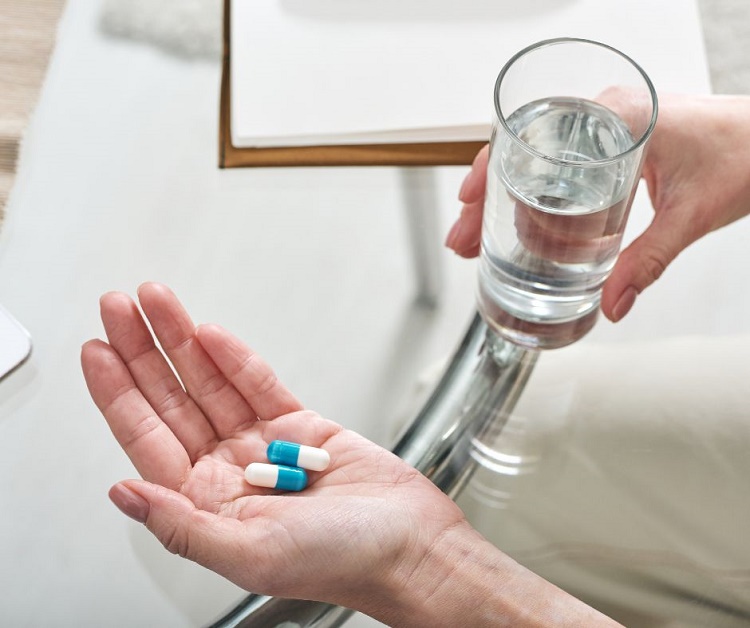
Often called “after-birth pains” this cramping can feel like the contractions of early labor or menstrual cramps. These after-birth contractions are your uterus working to shrink back into its normal size and shape. You may notice after-birth contractions the most if you breastfeed. This is because breastfeeding causes your body to release oxytocin, a hormone that causes uterine contractions. To help with the pain, consider using a heating pad or hot water bottle, talk with your doctor about the over-the-counter medications that are safe for you to take for pain. Your abdominal pain should ease up over time. If these pains get worse you should call your doctor.
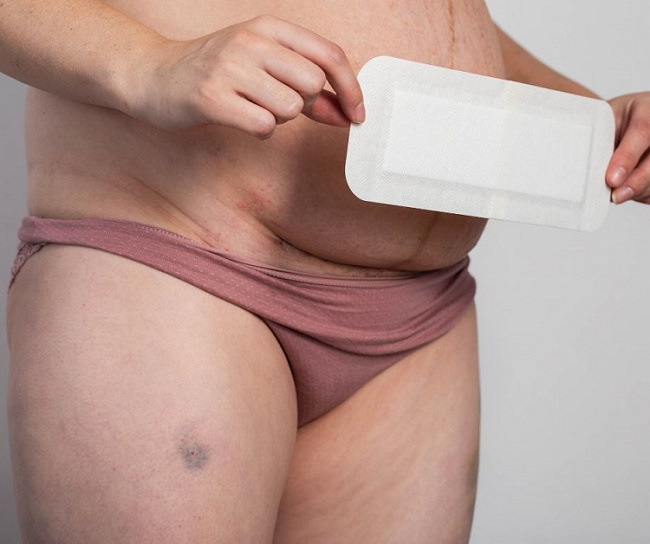
You will have vaginal bleeding and discharge (lochia). This is a combination of blood and tissue that was inside your uterus. Expect this to be heavier at first (up to 10 days), and to be bright red, it may contain blood clots. The bleeding, clotting and discharge will taper off over the next few days and weeks. Light bleeding and spotting can last up to six weeks after delivery. It is important that you use only sanitary pads during this time. Using tampons can introduce bacteria and lead to infection. If the bleeding is excessive, clots are bigger than a quarter or the discharge has a foul odor, you should contact your doctor.
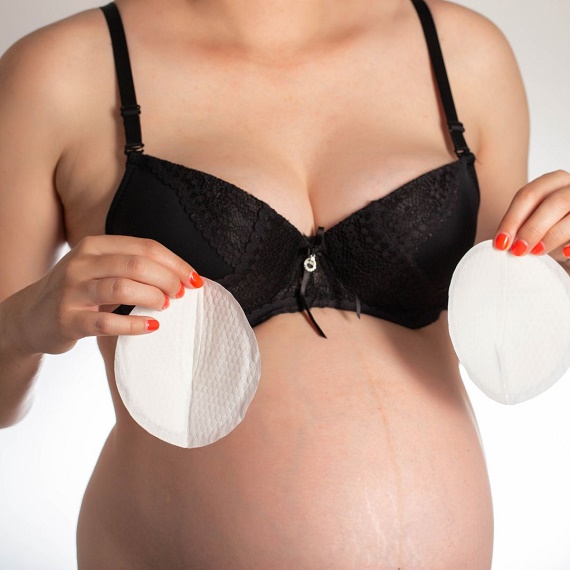
This is when your breasts swell as they fill with milk and is often noticed around the 3rd or 4th day after giving birth. Your breasts may feel tender, tight, firm, swollen and sore. The discomfort usually goes away once you start breastfeeding regularly. If you’re not breastfeeding, it may last until your breasts stop making milk, usually within a few days.

As soon as the baby and placenta are delivered your body will experience a decrease of progesterone and estrogen, influxes of oxytocin will continue over the next few days and levels of prolactin will start to rise. Later into the stages of postpartum, levels of cortisol will rise and levels of melatonin can lower. This rollercoaster of hormones can trigger many changes to your body, your mind, and to your emotions. By 6 months postpartum, hormone levels should start to level off and return to pre-pregnancy levels, but these changes in hormones can cycle so it’s important to talk with your doctor if you don’t feel like your hormones have adjusted or if you experience symptoms of hormone imbalance or postpartum depression.

This is only temporary. When your estrogen levels increase, your hair will return to its normal thickness. Hair loss usually stops within 6 months after you give birth. Your hair should regain its normal fullness within a year.
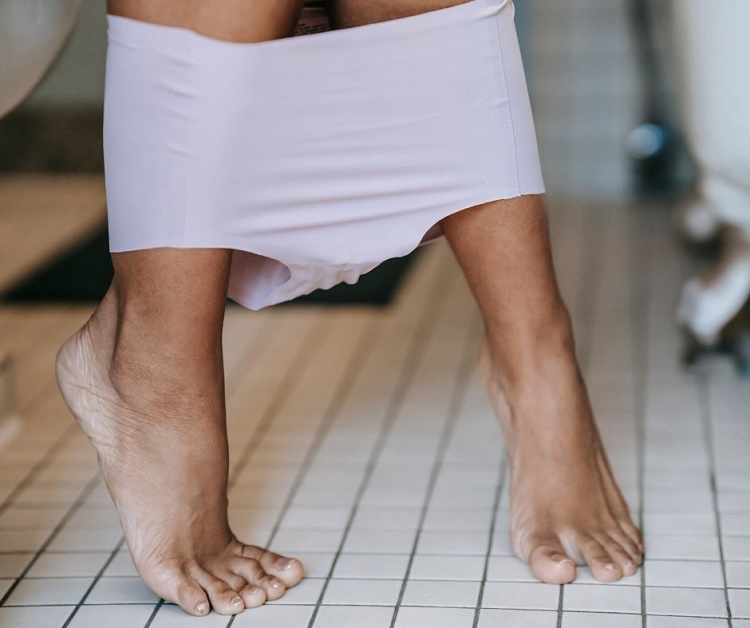
Hemorrhoids are painful, swollen veins in and around the anus. Hemorrhoids are common during and after pregnancy as a result of straining and pushing during birth or from complications with constipation. Hemorrhoids can be itchy, painful, and even bleed. Your hemorrhoids should shrink over time. If not, contact your doctor. What you can do: Soak in a warm bath, ask your provider about using an over-the-counter spray or cream for pain, eat foods that are high in fiber, such as fruits, vegetables and whole-grain breads and cereals, drink lots of water, try not to strain when you’re having a bowel movement (pooping).
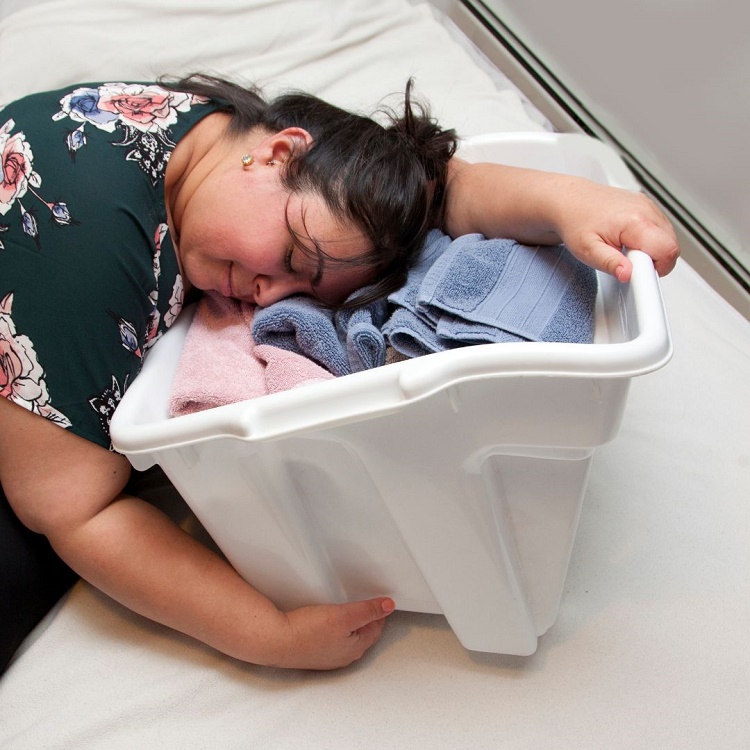
It is common to feel tired or fatigued after giving birth, this can be a result of the physical and emotional strain of the birthing process, blood loss during childbirth, changes in hormones, and lack of sleep.
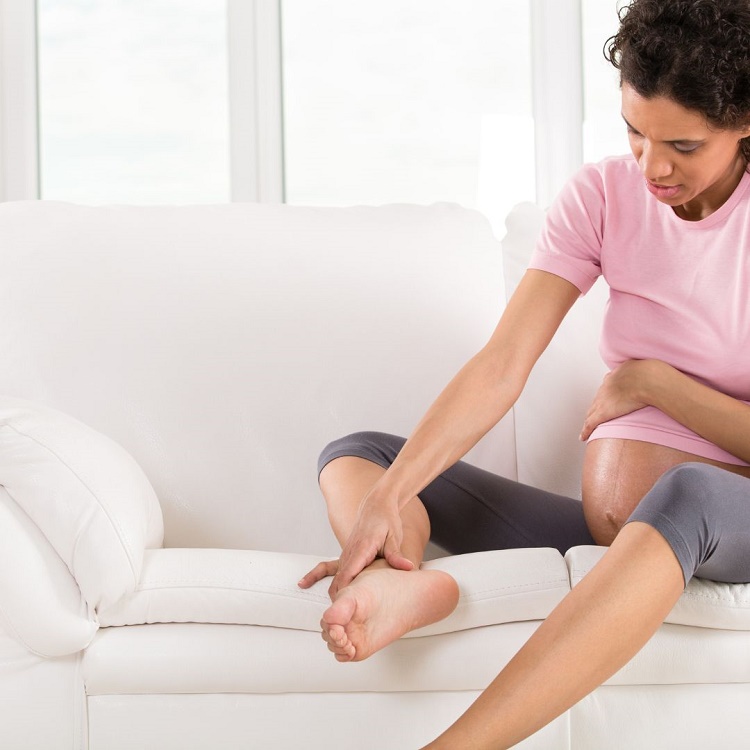
You may notice swelling in your hands, feet, legs or face, as a result of water retention after giving birth, it is important to notify your medical team as this may be a sign of complications. It is normal to have swelling in your breast, perineum (the space between the vagina and anus) rectum, and stomach- should these areas become tender, hot or red notify your medical team. With the swelling in your abdomen- you may be asking “Why do I still look pregnant” Over time, your uterus will shrink back to it’s pre-pregnancy size, but remember you are no longer the same women inside or out as you were before you gave birth. Embrace your mom body!
Emotional Changes

You may feel overwhelmed, easily frustrated with people or with situations, confused or sad often referred to as the “baby blues*”. During this time, it’s important to be kind to yourself. It can help to talk to your partner, loved ones, support groups or your medical team about how you feel. As many as one in 7 moms experience symptoms of depression and anxiety during the postpartum period.
It can be difficult adjusting to the role change (gaining the mother title/ feeling sad about the ‘loss’ of individual self) top that with continued mental changes and with hormone fluctuations, it can be a lot to handle. Remember this is normal and you are not alone!
Recovering From Delivery
Vaginal Delivery
A vaginal delivery is when a woman gives birth through their vagina. Vaginal deliveries are the most common and most preferred method of delivery. This is because they are typically low-risk and carry the most benefits to the mother and baby. After a vaginal delivery it is normal to experience cramping, vaginal bleeding and discharge and pain and swelling in the perineum. The perineum is the area between your vagina and anus. You may feel discomfort in this area for several weeks. This discomfort may be more if you had any tearing or received an episiotomy during labor and birth. If you have stitches due to a torn or cut perineum it will take 7-10 days to heal.
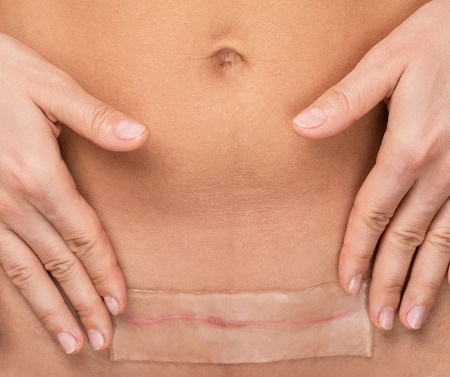 Cesarean (C-section) Delivery
Cesarean (C-section) Delivery
Cesarean delivery is surgical procedure, in which your baby is delivered through an
incision in your abdomen and uterus. A C-section is major surgery, so it will take
a while for you to recover. After a C-section it is normal to experience cramping,
vaginal bleeding and discharge and pain and swelling in the perineum. The incision
(cut) on your belly may be sore. If you have stitches from a cesarean birth (C-section),
these heal in varying degrees. The stitches in the skin should heal in 5-10 days.
The underlying stitches in your muscle layer will take longer to heal.
What you can do:
- Ask your provider for pain medicine. Check with them before you take any medicine for pain
- Ask your partner, family and friends to help you with the baby and around the house
- Get rest when you can. Sleep when your baby sleeps, even when he naps during the day
- Don’t lift from a squatting position. Don’t lift anything heavier than your baby
- Support your belly with pillows when you’re breastfeeding
- Drink plenty of water to help replace fluids in your body

As you begin to feel better, resist the temptation to do more. Overdoing things at this point can set you back in your recovery. Concentrate on nourishing your body with good foods, drinking plenty of water (especially if you are breastfeeding), and getting enough rest.
You’ll also need some supplies to help you recover:
Postpartum care and recovery supplies are often provided to you by the hospital but it’s a good idea to have these items at home too, that way everything is ready and available for you!
- Postpartum underwear/mesh panties
- Maxi pads - heavy/postpartum and liners
- Over the counter pain medication like Tylenol or Motrin *ask doctor before using
- Hemorrhoid pads and cream
- Over the counter stool softener
- Witch hazel
- Silicone scar sheets (for C-sections)
- Sitz bath
- Donut cushion
- Nipple cream/balm
- Breast pads
- Heating pad
- Peri-bottle
- Essential oils
Click link to view the vidaRPM Postpartum supply list available on Amazon: vidaRPM Postpartum Supply List
When to ask for help
Just because you’ve made it through delivery, you are not necessarily out of danger for health complications. There are life-threatening problems related to childbirth that can happen days or weeks after delivery.
If you have any of these symptoms call 911:
Pain in Chest
Any pain in the chest or intense abdomen pain
Breathing changes
Obstructed breathing or Shortness of Breath
Seizures
Seizures could mean something more serious is going on
Thoughts of self-harm
Thoughts of hurting yourself or someone else
Unusual bleeding/odor
Bleeding, soaking through one pad an hour or large blood clots.
Infected incision
Incision that is not healing: any pus, super redness or an odor from the incision.
Swollen leg
Red or swollen leg, that is painful or warm to touch
Fever
Temperature of 100.4 or higher
Headaches or Migraines with Aura
Bad headaches or migraines with vision changes
Your Next Doctor’s Visit - Postpartum Visit
The postpartum visit is a checkup for you that should happen in the weeks after you give birth. This visit is important. The appointment gives you an opportunity to have questions answered and to address your health priorities.
Even if you feel fine, you still need this appointment! All moms can benefit from the postpartum visit. Although it may be challenging to make time and get to this visit, you are worth it. Talk with your clinic about finding a time that will work for you. Ask your friends and family for help in making it to this visit. Most providers welcome you bringing your baby to the visit. If you do, it is helpful to bring someone along who can hold the baby during your exam.
Some women develop conditions, such as high blood pressure, gestational diabetes, and anemia during pregnancy. Your health care provider will need to check to see if these conditions have gone away. Women who have these conditions have an increased chance of having them again in a future pregnancy. You may also be a higher risk of developing diabetes or high blood pressure in the future.
Here are some helpful suggestions for your postpartum visit: My Postpartum Care Checklist
Mental health
During this time, your hormones will also be fluctuating this can affect your mental health. You may not be thinking clearly and will be more emotional. Things that used to not bother you may. You might feel more anxious, scared, or frightened. You may feel like you can’t take care of yourself or of your baby. It’s important to talk with someone about how you’re feeling. Reach out to a friend, partner, family member, medical care team, pastor, counselor, or support group. You can also call 988 or text 4PPD for immediate help.
Support Groups
Support groups are a great way to share how you’re feeling, get advice, check in with other moms and to build a support network. Look for a support group at your church or place of worship, in your community, or online.
Pickles and Ice Cream of Georgia and PSI Georgia are groups we trust and they offer online support group ran by trained moms across the state.
Check out their websites to find one that’s right for you!
Life with a newborn
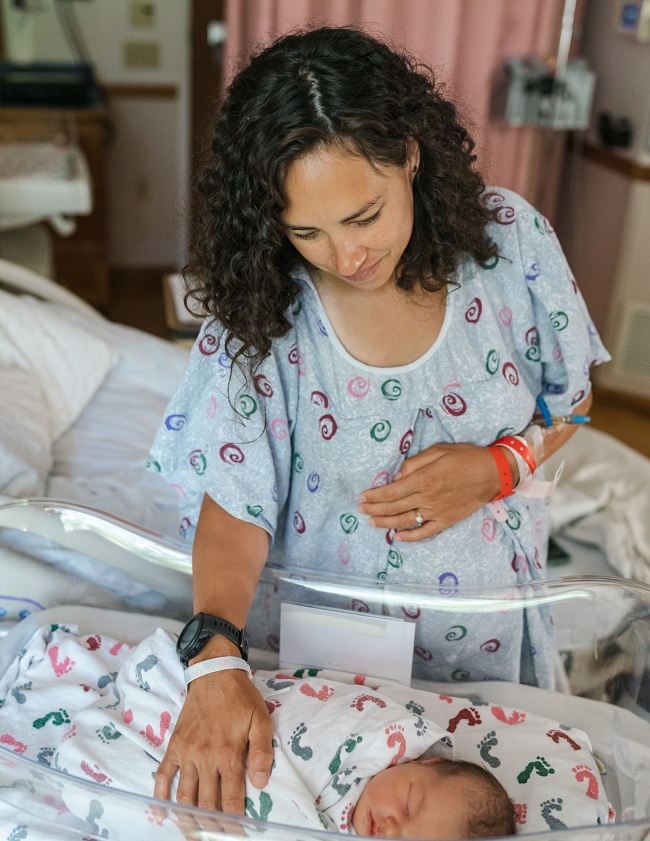
Your baby is finally here! Here’s what you can expect and some helpful tips on adjusting to life with a newborn.
In the first hours or days of their life, babies can have swollen faces or heads, their heads may be cone-shaped or uneven from passing through the birth canal, there may be even be bruising around the babies face or head, their bellies may protrude, and their umbilical cord may have a clamp on it that helps is to dry out and fall off within the coming days. Newborns usually have fine hair that covers their body, this is called lanugo and will fall out within a few weeks.
In the first few days at home, baby may sleep a lot, most newborns will sleep for about 16 hours a day. Make sure you talk with your doctor or pediatrician about SAFE SLEEP for babies. Most newborns feed every 2-3 hours. It is best to follow baby’s lead with feeding- most babies give ques that they are hungry but you may need to wake baby up to feed.
If you wonder whether you should call the doctor's office, do it, especially if you see something unexpected or different that concerns you.

Call if you see any of these signs:
- Rectal temperature of 100.4°F (38°C) or higher (in babies younger than 2 months).
- Symptoms of dehydration (crying without tears, sunken eyes, a depression in the soft
spot on baby's head, no wet diapers in 6 to 8 hours).
- A soft spot that bulges when your baby's quiet & upright.
- A baby that is difficult to rouse.
- Rapid or labored breathing (call 911 if your baby has breathing difficulty & begins
turning bluish around the lips or mouth)
- Repeated forceful vomiting or an inability to keep fluids down
- Bloody vomit or stool
- More than eight diarrhea stools in 8 hours
Helpful links & info
If you would like to find out how you can monitor your health, contact us today!